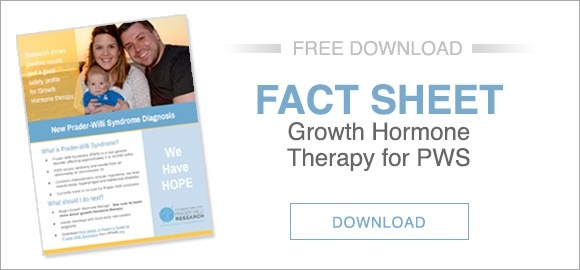 In multiple studies, human growth hormone (HGH) has been found to be beneficial for those with Prader-Willi syndrome. In June of 2000, growth hormone therapy for PWS was officially approved by the Federal Drug Administration (FDA) in the United States to treat children with PWS.
In multiple studies, human growth hormone (HGH) has been found to be beneficial for those with Prader-Willi syndrome. In June of 2000, growth hormone therapy for PWS was officially approved by the Federal Drug Administration (FDA) in the United States to treat children with PWS.
Benefits of Growth Hormone Therapy for PWS
Human growth hormone is effective not only in increasing height, but also in decreasing body fat, increasing muscle mass, improving weight distribution, increasing stamina, and increasing bone mineral density in PWS. In addition to these positive effects on growth and body composition, studies suggest positive effects on development and behavior.
There is increasing evidence that HGH treatment may improve cognitive performance in children with PWS. A study in 2016 by Dykens and colleagues [Cognitive and adaptive advantages of growth hormone treatment in children with Prader-Willi syndrome] showed that children with PWS who received HGH had higher IQ scores and better communication and daily living skills than children who had not received HGH. As with other studies, the results from the Dykens study suggest that "earlier is better": children starting HGH before 12 months of age had higher IQ scores compared to children who started HGH at ages 1–5.
Although the level of HGH normally decreases as people reach their final adult height, HGH is still produced in normal adults, and is thought to be important for maintaining good body compostion and cognitive performance. There is mounting evidence that adults with PWS benefit from continued HGH therapy, even after growth is completed. Adults treated with growth hormone show improvement in body composition, mental speed, mental flexibility, and motor performance (see studies here, here and here).
Research Shows Positive Results and a Good Safety Profile
The research on HGH therapy supports its benefits when used for PWS treatment, while continuing the trend of a reassuring safety profile. One concern when GH first came into clinical use was whether its in children might increase the risk of leukemia. But the study Long-term safety of recombinant human growth hormone in children [Bell, 2010] followed almost 50,000 children who received growth hormone between 1985 and 2006 (some with PWS, some on HGH for other reasons) and does not support that concern: slightly less than the expected number of children in this group developed leukemia (3 cases observed, 5.6 expected).
Other concerns specific for PWS include scoliosis and breathing issues. Scoliosis is very common in PWS, and some physicians may be concerned about HGH use in individuals with PWS who develop scoliosis. But the data suggests that HGH does not worsen scoliosis outcomes; if anything, it is associated with better outcomes, perhaps due to strengthened muscles (see guidelines, below, as well as a recent review and a previous FPWR blog). Finally, HGH may cause tonsils to grow, which can worsen obstructive sleep apnea, and thus a sleep study is recommended before and shortly after starting HGH, with involvement of an ears, nose and throat doctor to address enlarged tonsils, as needed.
Guidelines for Use of Growth Hormone
International consensus guidelines for the use of human growth hormone in PWS were published in 2011. These published guidelines can be used by medical professionals as a guide for treatment using HGH and can be found here.
Videos on Growth Hormone Therapy for PWS
The following video explains the role of human growth hormone for PWS, the benefits of this therapy, and how to initiate treatment:
In addition, the following videos are from past FPWR conference presentations on use of human growth hormone in treating PWS, by endocrinologist Jennifer Miller M.D.:
For more information about PWS treatments and therapies, download FPWR's e-booklet First Steps: A Parent's Guide to Prader-Willi Syndrome.
Learn more about the importance of growth hormone therapy for PWS.








